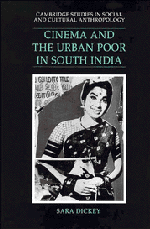6 - Film themes
from Part II
Published online by Cambridge University Press: 24 October 2009
Summary
Taken together, the films recounted in the previous chapter illustrate the typical themes of Tamil movies. They focus on relationships between women and men or among family members, or on issues of class identity and class relations. Movies frequently revolve around a crisis or difficulty in one or more of these areas, thereby raising issues about which many Tamils feel substantial anxiety. Instead of exacerbating this anxiety, however, films mitigate it by subsequently portraying solutions. But these resolutions are not realistic answers that could be applied in everyday life; rather, they are almost always dependent on a coincidence that magically wipes out the difficulty, making it appear that the crisis is not really a problem at all – and certainly not a problem worthy of concern.
Relationships between women and men
Each of these films presents one or more of the images of women and men, and of their relationships with each other, that are typical of Tamil movies. In film portrayals of these relationships, it is frequently the woman's behavior that stands out as worthy of comment. Male behavior appears taken for granted in that it is portrayed as a justifiable reaction to a woman's actions. This is not always the case, but it was both my general perception and the implicit assumption of viewers as they related movie stories to me.
- Type
- Chapter
- Information
- Cinema and the Urban Poor in South India , pp. 89 - 116Publisher: Cambridge University PressPrint publication year: 1993



